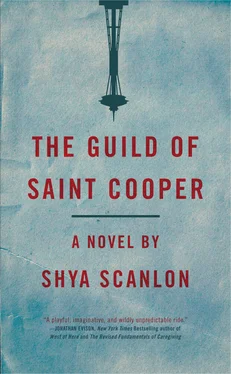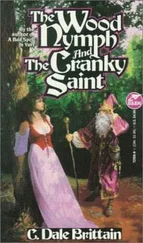“Are you going out?” she asked.
In a minute there is time for decisions and revisions which a minute will reverse . The two-headed beast had come to an arrangement, I realized, and it was giving me permission to take my leave.
“I’ll be back soon.”
“Okay, sweetie. Is that for me?”
I put her package down on the couch beside Alice, who looked up at me in irritation — I was interrupting the story. I backed slowly out of the room. My mother would be fine, of course. Alice would be fine. Truly, it would be condescending to think otherwise. What did I know about taking care of children? Echo had just begun to pull away from the house, but stopped when he saw me, and reached over to push open the passenger-side door. Minutes later we were driving south on Aurora through the zoo.
Traffic on the road had slowed to a stop-and-start, had left us nearly idling between the lush green overhangs of Woodland Park. I had not asked where we were going and was not really concerned. We drove for a time beside a convertible driven by a dark-skinned woman with long arms, and I tried not to stare.
“What the fuck,” said Echo.
We swerved to the side so he could look up ahead, but a small rise prevented us from seeing the traffic jam’s cause, and with the park to either side we couldn’t change our route for the next quarter mile. I reached for the stereo, but Echo told me not to bother.
“All static,” he said. “It’s the only shitty part about this job. I keep telling them to fix it, but they tell me it’s not high on their list of priorities.”
“I could see that.”
“Yeah? I think morale should always be high on a company’s priority list.”
“I could see that, too.”
“What’s up with you, Blake? You seem dyspeptic.” Echo grinned.
“I wouldn’t know,” I said. Gloomy.
“You remember my girlfriend Blake?”
“Or pessimistic.”
“She’s in some weird relationship with an older guy. It’s not sexual, I don’t think, but he’s got some kind of control over her. I can’t figure out what to do. Or if I should do anything.”
“Irritable.”
We approached a pedestrian bridge, and on it a young boy holding a blue balloon was standing with his father. The father looked down at us, smiling and speaking to his son, who ignored both the traffic and his dad. The kid let go of the balloon and watched as it rose higher and higher until, just as it was about to disappear over the treetops, it snagged on a dead oak branch and darted back and forth like a fat pet. In a short burst of forward movement, we crept under the bridge and came to another complete stop. This one lasted two, three minutes. Five. Engines began turning off.
“This is un-fucking-believable,” said Echo.
“Must be an accident.”
“Well, duh.”
“At least we’re out of the sun.”
Echo looked at me and considered.
“See, I’m not pessimistic.”
Echo turned off the car. He reached across my lap, flipped open the glove compartment, and removed a tin box. The top sported a piece of duct tape bearing the words FIRST AID. We were in the far right lane, and beside us an older woman in a beat-up Dart gripped the steering wheel as though still moving.
“If that’s for the accident,” I said, “I’m sure they have everything they need.”
“Yeah, but I don’t have everything I need.”
Inside the box was all manner of drugs. There were two rolled-up sandwich bags full of white pills, a few tiny Ziploc bags of weed, and he rifled around until he found a flat square of paper. He undid a folded side, sprinkled a small mound of white powder on the back of his hand, and snorted it, then held the square in my direction. I reached for it but he pulled it out of reach, saying, “Give me your hand.” I held it out, palm down.
After we’d done a couple bumps of coke, he pulled a joint out of his box, placed the tin back in the glove compartment, and climbed out of the car. I joined him, standing on a small tuft of grass that rose from the sidewalk and terminated in the cool, damp stone arch. Traffic still had not moved at all, and sirens could be heard clearly, though it was unclear from what direction. Under the stone bridge, sounds echoed back and forth, always changing, as though we were slowly spinning. The coke had made my front teeth go numb, and I lightly tapped them as my thoughts accelerated. We could easily get caught, I was thinking. There would be nowhere to go, I was thinking. Yeah, I was thinking, but how could the cops even get in here? Ha, I thought.
The pot mellowed me out, but it didn’t return me to normal. I was on a track parallel to sobriety — an alternate reality where everything was both more sinister and more fun. The underside of the bridge echoed with whispers, and the idling cars choked out beautiful plumes of exhaust that undulated in the sun beyond the edge of the bridge’s shadow.
“Have you ever wondered why a house feels empty sometimes and not other times?”
Echo took a hit from the joint and passed it to me. “Because sometimes there are people in it, and sometimes there aren’t.”
“I was in this house yesterday. There were three of us there, and there was furniture and, you know, everything a house has. But it felt totally empty. It just, like, emitted a feeling of emptiness. It’s difficult to describe, but you can be in a completely empty house, meaning nobody’s home, it’s just you — you don’t even have to live there — and the house doesn’t feel empty. Or, you know nobody’s there, I’m not talking about feeling like someone’s watching, or some kind of haunting, but a real sense of presence, or maybe, no, maybe it’s just the absence of a feeling of absence. That’s more of what it’s like. So why is that?”
I suddenly felt entirely alone. It was the drugs, of course, but a shiver ran through my body so forceful it almost made me drop the joint. Echo was not a companion, I saw clearly, and this was not a little ride. It was a betrayal. Nearly everywhere I could think of was more important than being here, so why had I come? I came because I was trying to sabotage my chances of being a good person. I stepped into the sun and could see the blue balloon still caught in the high branches, nearly invisible against the sky above.
“When I was growing up,” Echo said, “I used to love it when no one was home. That was the only time I could relax. I won’t go into it really because it’s kind of depressing and also stereotypical and boring, but let’s just say that my dad was a fucking dick and my mom was a moron. Is. Anyway, I’d come home from school, say, and open the door really slow, as slowly as I could, like by opening it slowly I could just freeze time and look around and then make a decision about what I wanted to do, whether I wanted to stay or leave. My dad would always be out, still at work. But my mom had some weird schedule and sometimes she’d be there and sometimes she wouldn’t. So I’d poke my head in and look for her keys or her purse or something, or I’d listen to whether the TV was on, but I think more than anything it was just a feeling, like, yep, the house is empty. Or, nope, someone’s home. Maybe it was something I’d hear, really. But that’s not how it seemed to me at the time. At the time, there was some kind of intuition, something so subtle I wasn’t even aware of it, and what I’d feel, standing there at the door, was either a sickening sense of dread — someone’s home — or a lightness, an overwhelming feeling of possibility and freedom — no one’s home.”
I brushed my hand across the moist stone of the bridge and Echo gave me a nudge, pointed. A white sedan was driving toward us on the sidewalk. It was coming slowly, but neither of us had noticed it before, which made it seem sudden, fast, and we froze. It stopped five feet from us, and a man with cropped hair, reflective sunglasses, and a mustache climbed out. Echo hid the joint behind his back and smiled stupidly, but the man stood before him and without a word pointed down to where he was holding it. Echo brought it around before him as though in a trance. The man took it, brought it to his lips, and took three quick puffs. Then he handed it back, returned to his car, and passed by, driving toward the source of stalled traffic.
Читать дальше












